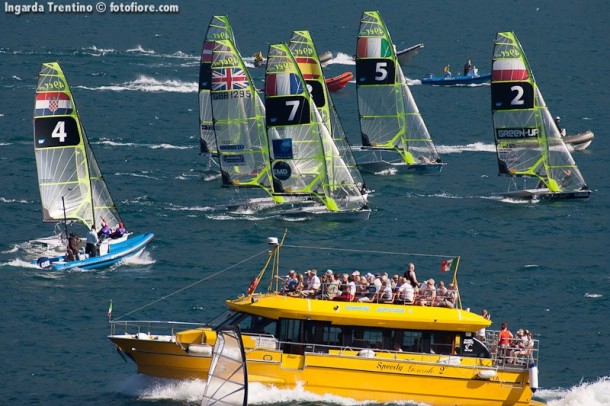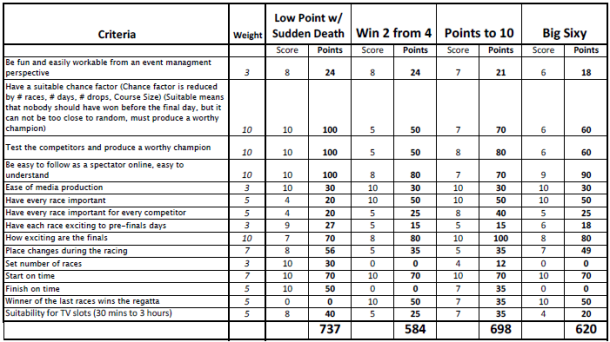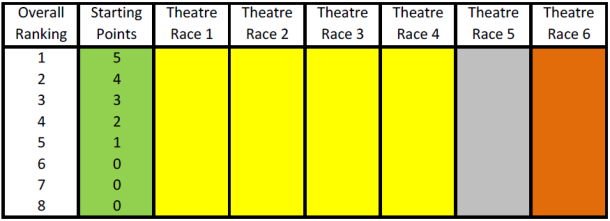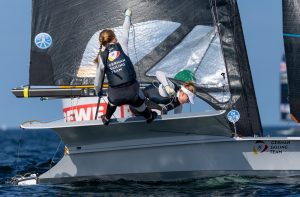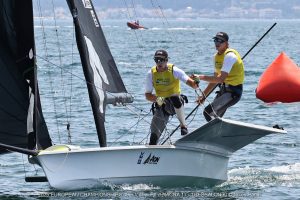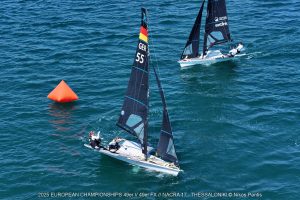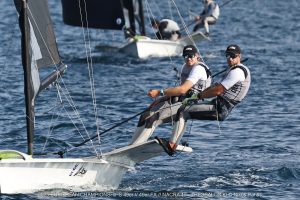The 49er class is central to things going on in the sailing world. The class has been included as ‘core’, which means it will be included in the Olympics all the way through 2020. The class has also been leading sailing into new format options to increase the media appeal. ISAF also banned Tower Trapezing… so needless to say, the 49er is at the center of the action!
The ISAF World Cup and EUROSAF Champions Series 2013 have declared that they support classes that wish to experiment with their formats in 2013. The 49er class will trial various Theatre Style Racing options while other classes will trial other formats so that each class can race in a format that best suits it. By September 2013, all classes are expected to state their preferences to ISAF in advance of a final debate in November 2013. The outcome of the ISAF conference in 2013 will be the Rio 2016 formats.
A Format Task Force is operating within the 49er class made up of Ben Remocker, Marcus Baur, Max Lutze, and Allan Norregard. We started out by creating a table of all the characteristics we think are important to 49er racing.
Initially, we are only discussing the format within a round of racing. We have not yet started discussing how those formats can be embedded into different overall regatta formats.
The cirteria
The most crucial piece of the whole exercise is being clear on what we are trying to achieve. We have summarized our thoughts in a table of desirable characteristics. As you review them, it’s easy to see why there is no single perfect option. The format we choose will have positives and drawbacks, as in life, and we will have to find a compromise. Let’s aim for very good!
2 formats that did not make it for further discussion
Winner take all Shoot Out
Like we did in Garda, a winner take all shoot out is an attractive option on the surface. The winner of the final race wins the event. There is a single culminating focus point for media and sailors… unfortunately, there are a couple of things going against it.
First and foremost is the chance factor. It has a very high chance factor, 1 in X where X is the number of boats in the final race… so then the logical thing to do is decrease the number of boats, to decrease the chance factor, and then you’re left with only 4 boats. After reviewing the 11 Theatre Style Races in Garda, we found that the least exciting race with the fewest passes and least going on was the Grand Final, with only 4 boats. It just isn’t that exciting to watch without passing or tight action.
The final little detail to note is that watching racing at the front of the fleet isn’t always the most exciting. It is more often that the best battles occur in the middle of any fleet… therefore, if we focus only on the winner, we also loose excitement.
A Match Race Final
The obvious solution to the problem described above is to have a match race final. That brings the chance factor down to an acceptable level.
The issue is that the pre-race skills for a match race are dramatically different to those required for a fleet race. Usually, the start determines everything unless both teams are very good at match race starting, in which case you get an actual match race.
That would mean that all of our sailors would have to dedicate a huge amount of time to develop a skill which is hardly ever used in their racing. We think that is not fair to the sailors, and ISAF have said they won’t allow it for the same reason. ISAF’s experience in moving to a match race format dates back to the Soling days, and they do not want to repeat that experience.
The top 4 contenders for future consideration
Balanced Low Point with Sudden Death and Golden Life
The Outline: The top 8 at the end of the fleet racing move on to the Theatre Style Final. They carry with them a certain weighting of their scores from the qualifying and fleet racing. Then they race 3-5 races ‘in the theatre’ to produce a winner based on low point.
The Sudden Death part means that if any team builds an insurmountable lead, the regatta is over – and they are crowned the champions.
The Golden Life part means that if any team is able to win say 2 of 3 races or say 3 of 5 races, then they automatically win the Gold with the regatta stopping at that point and everything else determined by low point.
The Argument: This option is the closest we have to traditional (for 49er) Olympic racing. Of all the options we looked at it has the lowest ‘chance factor’ which is a blend of having racing spread out over a number of days, races, with discards, and on a bigger course. Each of these items decreases the chance factor and, therefore, contributes to having the sailor who has sailed the best over the regatta winning the regatta.
Proven to be a good number for excitement is 8 boats per race, and low point is a great format. The Sudden Death part is put in so that we don’t continue racing after we guarantee a winner. To spice this up, we thought we’d add a ‘Golden Life’ element to the regatta. Any team that wins 3 races would automatically win the event. This is to reward an outstanding effort; after all, winning 3 races from 5 against the best in the world is pretty special!
This option is the most similar to what we did at Lake Garda, 2012. As we work with broadcasters to format the overall strategy and the amount of time we should be broadcasting the final for, we may have to increase the number of races to get the duration right. Therefore, in order to get the balance right between the rest of the regatta and the final day in terms of importance, we may have to add the extra qualifying ‘days/points’.
We think we want to broadcast for longer than 40 minutes, which is just what 3 races will take… so in order to keep the balance of weighting on the final day at 55-75%, we need to add more points scoring ahead of the final day.
Win 2 from 4
This format is a derivation of one that the 49er class has used before. It was tried in Medemblik during the Holland regatta in 2005/6 on an epically 30 knot windy day.
The Outline: 8 teams race in the Theatre starting on equal points. The low point winner scores 1 win just like the winner going into the final day scores 1 win (limit 1 pre-win). Then the top 4 teams enter the Grand Final with the first to win 2 races crowned the champion and low point scoring to decide the other places.
The Argument: This format has the benefit that it’s the winner of the final race that wins the regatta. It also scores ‘wins’ for teams who do well in both traditional racing formats and the 8 boat Theatre Style racing.
One drawback of this racing is that with only 4 boats it is not that exciting to watch – as passing opportunities are reduced quite a lot.
Points to 10
The Outline: This format is a dash to 10 points where 8 teams enter the final bringing with them points from their gold fleet placing. Points are awarded to the top 4 finishers in each race (4, 3, 2, 1). The rest don’t score any. The first team to get at least 10 points wins the event, the rest of the fleet keeps racing until silver gets 10 points, and likewise for Bronze.
The Argument: This format adds complexity to the game the sailors are playing. Not only must they sail well themselves, but at times they’ll need to make strategic choices based on how many points their competitors have. Another positive is that it is likely to produce multiple climaxes… as soon as the excitement of winning the gold is taken on board, the coverage will move back to the Silver medal and Bronze medal races thereby increasing the excitement factor.
A downside to this format is the riskiness of each race as only top finishes count for points. Not only is this obviously a change to how we normally sail, but often, the most exciting battles are not for the lead in a sailing race, but more likely to be mid-fleet. With 4 team from 8 scoring points, it is somewhat mitigated, but it is something to be monitored.
Big Sixy
The Outline: After the qualifying and fleet racing, 6 boats head into Theatre. The winner of the event is the first team to win 2 races. The leader heading into the final day takes in 1 pre-win… for everyone else starts even, except for the point. The rest of the positions after the gold is awarded are done on low point scoring.
The Argument: The benefit of this format is that the winner of the final races crosses the line first. It is fairly high on the chance factor as it only takes 2 races to turn a championship around. It also suffers from a broadcasting point of view as the grand final could be 1 race long or 6.

